
Chendamangalam is a small town and a panchayat in Paravur Taluk, Ernakulam district in the state of Kerala, India.
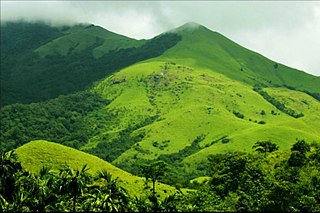
Madikeri is a hill station town in Madikeri taluk and headquarters of Kodagu district in Karnataka, India. Its original name was Muddurajanakeri which means "the capital of Maharaja Mudduraja".
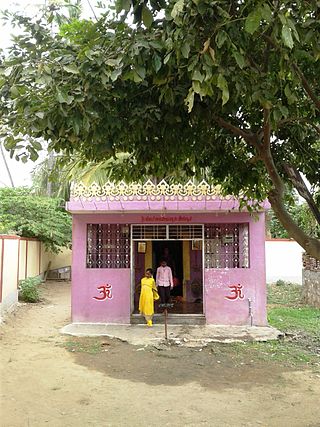
Yelandur is a taluk and town in Chamarajanagar district in southern Karnataka, India. It has historic and cultural importance in this region. Along with three other taluks, it was officially included into Chamarajanagar district when the district was notified upon bifurcation of Mysore district in 1997.
Mulabagilu is a town and administrative center of Mulabagilu taluk, in the Kolar district in the state of Karnataka, India. The town is situated on the National Highway 75 and is the easternmost town of the state.

Bylakuppe is an area in Karnataka which is home to the Indian town Bylakuppe and several Tibetan settlements, established by Lugsum Samdupling and Dickyi Larsoe. Bylakuppe is the largest Tibetan settlement in the world outside Tibet. It is located to the west of Mysore district in the Indian state of Karnataka which is roughly 80 km from Mysore city.
Chitapur or Chittapur is a town and taluk in Kalaburagi district in the state of Karnataka, India. It is also the headquarters of the Chittapur taluk. It is known for polished stones and toor dal.

Kudavasal or Kodavasal is a panchayat in Thiruvarur district in the Indian state of Tamil Nadu. The town is the headquarters of Kudavasal taluk.
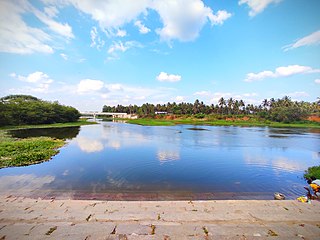
Maddur is a town in Mandya district in the Indian state of Karnataka. It lies on the banks of the river Shimsha. It is 82 kilometers from the state capital Bangalore and 60 kilometers from Mysore. Derived from Maddu a term referring to chemicals used for explosives.

Mundgod is a town in Uttara Kannada district of Karnataka state in India, Mundgod is known for its Tibetan Colony; it is also known as Mini Tibet.

Nagamangala is a PuraSabhe and a taluk in Mandya district, in the Indian state of Karnataka.
Nilakkottai is a town in the Dindigul district of the Indian state of Tamil Nadu. The town was established in 1958, as 1st Grade Town Panchayat. In 1970, it was changed to Selection Grade. The Town Panchayat has been under the municipal act since 1996. In 2004, it was called Special Village Panchayat, and in 2006, Selection Grade Town Panchayat.
Pullambadi is a Panchayat town in Tiruchirappalli district in the Indian state of Tamil Nadu. Pullambadi town panchayat heads the revenue block of Pullambadi in the taluk of Lalgudi.

Rewalsar or Tso Pema in Tibetan is a small town and a pilgrimage place in a nagar panchayat in Mandi district in India. It is located in the state of Himachal Pradesh. The local name for Rewalsar is Tri Sangam. Rewalsar Lake is a tourist spot in the area.

Tegar, also known as Kyagar, is a high-altitude village in the Leh district of Ladakh, India. It is located in the Nubra tehsil, in the Nubra Valley.
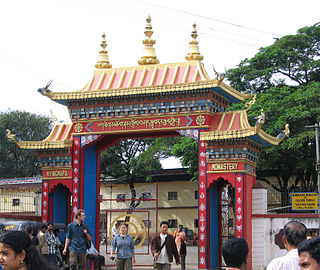
The Namdroling Nyingmapa Monastery or Thegchog Namdrol Shedrub Dargye Ling(བོད་ཡིག ཐེག་མཆོག་རྣམ་གྲོལ་བཤད་སྒྲུབ་དར་རྒྱས་གླིང་།), or ನಮ್ಡ್ರೋಲಿಂಗ್ ವಿಹಾರ is the largest teaching center of the Nyingma lineage of Tibetan Buddhism in the world. Located in Bylakuppe, part of the Mysuru district of the state of Karnataka, the monastery is home to a sangha community of over five thousand lamas, a junior high school named Yeshe Wodsal Sherab Raldri Ling, a religious college and hospital.
There is a small Mongolian community in India, comprising mostly Buddhist monks and scholars as well as international students from Mongolia.
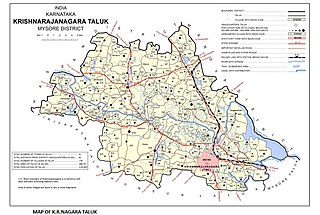
Saligrama is a new sub-district of Mysore district, situated on the northern bank of the river Cauvery [Kaveri]. This place is esteemed as sacred by the Shri Vaishnavas on account of its having been the residence of Sri Ramanujacharya. It is the headquarters of Saligrama Taluk. It was established as a new taluk carving out of K.R.Nagar taluk with effect from 31.12.2020 and become ninth taluk of Mysore district of Karnataka, India.
Alathur is a village in the Mannargudi taluk of Tiruvarur district in Tamil Nadu, India.

Sagara is a city located in the Indian state of Karnataka. It is also a sub divisional and a taluk headquarters. Located in the Sahyadri Mountain range on the banks of river Varada, it is known for its proximity to Jog Falls and to the historical places of Ikkeri, Keladi and Varadamoola. The river Varada originates near Varada-moola. Sagara subdivision consists of Sagara, Soraba, Hosanagara and Shikaripur taluks.

Mysore–Bangalore line is a fully electrified double line from Mysore Junction to Bangalore City.































